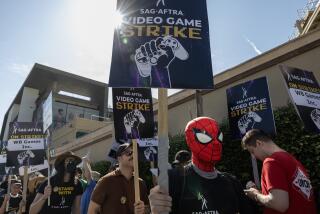Directors Guild reaches deal on a new contract with the studios

The Directors Guild of America said it has reached a “historic deal” with the major studios on a new three-year film and TV contract.
In a statement, the DGA negotiating committee said that it reached a tentative agreement with the Alliance of Motion Picture and Television Producers that includes wage increases, a new structure to pay foreign residuals — which had been a key priority for the union — and restrictions on the use of AI.
The DGA’s talks with Hollywood studios come at a time of widespread labor strife in Hollywood. The industry is bracing for a writers’ strike.
“We have concluded a truly historic deal,” said Jon Avnet, chair of the DGA’s negotiations committee in a statement. “It provides significant improvements for every director, assistant director, unit production manager, associate director and stage manager in our guild. In these negotiations we made advances on wages, streaming residuals, safety, creative rights and diversity, as well as securing essential protections for our members on new key issues like artificial intelligence — ensuring DGA members will not be replaced by technological advances.”
The DGA, whose current contract is set to expire June 30, began talks May 10. The union represents 19,000 directors and their teams.
The agreement announced late Saturday night ends what many had predicted would be contentious negotiations with the DGA, but it’s unclear what effect it will have on the standoff with writers, who have been on strike since May 2 in a dispute over streaming pay and other issues.
Though some of the terms agreed to by the DGA could also apply to writers, the WGA has made clear that the situation is very different from 2008, when the DGA negotiated a deal that helped to resolve the previous writers’ strike that lasted 100 days.
The proposed DGA deal, for example, does not address core demands from the WGA regarding the minimum number of writers hired for TV shows and the spread of much-maligned “mini-rooms.”
In a note to members last week, the WGA said: “To resolve the strike, the companies will have to negotiate with the WGA on our full agenda.”
Despite tensions in negotiations, there was little expectation that the DGA — which did not seek a strike authorization vote from members and has a tradition of early bargaining — would join the writers in a walkout.
Throughout its 87-year history, the DGA has staged a strike only once — a walkout in 1987 that lasted five minutes (or 12 minutes by some accounts).
The proposed agreement calls for a 5% increase to wages in the first year of the contract, 4% in the second and 3.5% in the third.
The DGA said it also gained new residuals to reflect international viewership as well as greater transparency from studios and streamers on reporting these payments. The measures would represent a 76% increase in foreign residuals for the largest platforms. Residuals for a one-hour episode would be about $90,000 for the first three years.
The deal also secures residuals for new free streaming platforms Freevee, Tubi and Roku.
Additionally, the terms included a reduction of working hours for assistant directors; advancements in safety including a ban of live ammunition on sets; payment for the preparation time of feature directors before the start of filming; and funding for a new parental leave benefit.
The contract also stipulates that AI cannot replace the duties performed by members.
The DGA board will vote Tuesday on whether to approve the deal, which also must be ratified by members.
More to Read
Inside the business of entertainment
The Wide Shot brings you news, analysis and insights on everything from streaming wars to production — and what it all means for the future.
You may occasionally receive promotional content from the Los Angeles Times.












